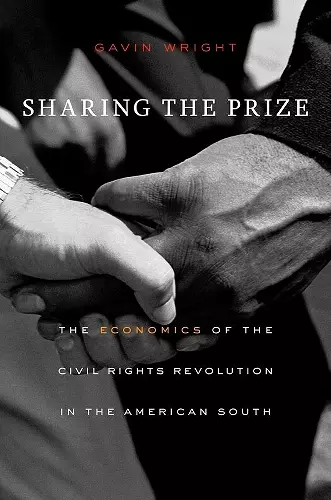Sharing the Prize
The Economics of the Civil Rights Revolution in the American South
Format:Paperback
Publisher:Harvard University Press
Published:22nd Feb '18
Currently unavailable, and unfortunately no date known when it will be back

Winner of the Alice Hanson Jones Prize, Economic History Association
A Choice Outstanding Academic Title of the Year
The civil rights movement was also a struggle for economic justice, one that until now has not had its own history. Sharing the Prize demonstrates the significant material gains black southerners made—in improved job opportunities, quality of education, and health care—from the 1960s to the 1970s and beyond. Because black advances did not come at the expense of southern whites, Gavin Wright argues, the civil rights struggle was that rarest of social revolutions: one that benefits both sides.
“Wright argues that government action spurred by the civil-rights movement corrected a misfiring market, generating large economic gains that private companies had been unable to seize on their own.”
—The Economist
“Written…with the care and imagination [Wright] displayed in his superb work on slavery and the southern economy since the Civil War, this excellent economic history offers the best empirical account to date of the effects the civil rights revolution had on southern labor markets, schools, and other important institutions…With much of the nation persuaded that a post-racial age has begun, Wright’s analytical history…takes on fresh urgency.”
—Ira Katznelson, New York Review of Books
Written by Stanford’s Gavin Wright with the care and imagination he displayed in his superb work on slavery and the southern economy since the Civil War, this excellent economic history offers the best empirical account to date of the effects the civil rights revolution had on southern labor markets, schools, and other important institutions… With much of the nation persuaded that a post-racial age has begun, Wright’s analytical history…takes on fresh urgency. -- Ira Katznelson * New York Review of Books *
Wright argues that government action spurred by the civil-rights movement corrected a misfiring market, generating large economic gains that private companies had been unable to seize on their own. * The Economist *
The civil rights movement of the 1960s has had a lasting impact on American society. Although it has hardly been neglected by historians, until now there has been no comprehensive economic interpretation of these events. In this volume, Wright offers an important and illuminating reinterpretation of the civil rights movement and its consequences for both black and white economic progress in the subsequent half century. -- J. L. Rosenbloom * Choice *
Gavin Wright has written a definitive study of the economic implications of the civil rights revolution in the American South. He shows that while highly useful, economic analysis must be richer and more socially oriented than usual in characterizing the nature of racial discrimination in the South. -- Kenneth J. Arrow, Stanford University
By placing economics at the heart of his investigation of the central issues of the civil rights movement, Wright deepens and expands our understanding of what was at stake for those who participated in the civil rights movement as well as those who opposed it. -- James C. Cobb, University of Georgia
Sharing the Prize is an exceptionally rich study of the civil rights revolution in the American South and will immediately become the book on its economic dimensions. -- Peter A. Coclanis, University of North Carolina at Chapel Hill
Sharing the Prize transforms quite dramatically our understanding of the economics of the civil rights movement in the South, showing how the civil disobedience of black Southerners wrought a transformation that improved the lives of whites as well as blacks. -- Naomi R. Lamoreaux, Yale University
- Winner of Alice Hanson Jones Prize 2014
- Nominated for Pulitzer Prizes 2014
- Nominated for Ellis W. Hawley Prize 2014
- Nominated for James A. Rawley Prize 2014
- Nominated for Benjamin L. Hooks Institute National Book Award 2013
ISBN: 9780674980402
Dimensions: unknown
Weight: unknown
368 pages